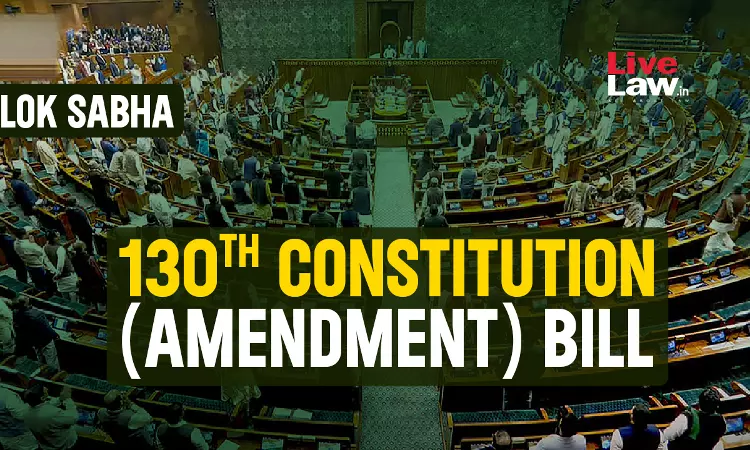
On August 21, 2025, the Lok Sabha referred the highly controversial Constitution (130th Amendment) Bill, 2025 to a Joint Parliamentary Committee (JPC) for further scrutiny.
The bill, introduced by Union Home Minister Amit Shah, seeks to establish a strict framework for removing top political executives—including the Prime Minister, Chief Ministers, and other Ministers—if they remain in jail for 30 consecutive days on charges of serious criminal offences.
Key Provisions of the Bill
- Automatic Removal Rule: If any PM, CM, or Minister is arrested and detained for 30 consecutive days on charges punishable with five years or more in prison, they must vacate their office on the 31st day.
- Authority of Removal:
- The President will remove the Prime Minister.
- The Governor will remove the Chief Minister.
- CMs will remove their council ministers.
- For Union Territories, the Lieutenant Governor holds this authority.
- Reappointment Clause: A leader removed under this provision can be reappointed after release from custody.
- Amendments Involved: The bill seeks to amend Articles 75, 164, and 239AA of the Constitution, and Section 54 of the Jammu & Kashmir Reorganisation Act, 2019.
Objective Behind the Move
The government argues the amendment is essential to:
- Strengthen constitutional morality and restore public trust in governance.
- Ensure good governance by preventing leaders from ruling while under arrest.
- Address the long-standing issue of criminalisation of politics, where leaders facing serious charges continue to hold office.
Latest Developments
- The bill has been referred to a Joint Parliamentary Committee (JPC) for in-depth review before final voting.
- Government’s Stand: Amit Shah called it a “historic step” towards cleansing Indian politics and argued that elected leaders should face at least the same accountability as civil servants.
- Opposition’s Protest: Congress, TMC, and regional parties staged walkouts, tore up copies of the bill, and accused the Centre of using investigative agencies to target opposition leaders.
- Public Debate:
- Civil society groups welcomed the move as a deterrent to corruption.
- Legal experts remain divided—while some argue it is consistent with ethical governance, others say it undermines the presumption of innocence and risks misuse.
- Judicial Angle: Constitutional experts anticipate the law, if passed, could be challenged in the Supreme Court, testing the balance between accountability and democratic rights.
Support and Criticism
Supporters say:
- Long overdue reform to decriminalize politics.
- Ensures leaders cannot misuse office while in prolonged custody.
- Enhances public trust in political leadership.
Critics argue:
- Risks turning India into a police state where arrests can be weaponized.
- Violates federalism and the democratic mandate of elected leaders.
- Could disproportionately impact opposition-led states.
Wider Implications
- If implemented, the bill could affect high-profile leaders currently facing investigations, such as Delhi CM Arvind Kejriwal or Jharkhand’s Hemant Soren, who have both spent extended periods in custody.
- It could set a precedent for stricter standards of accountability across all levels of governance.
- May trigger constitutional challenges similar to those seen after the abrogation of Article 370.
Quick Facts
- Bill Name: Constitution (130th Amendment) Bill, 2025
- Introduced: August 20–21, 2025
- Status: Referred to JPC for review
- Covers: Prime Minister, Chief Ministers, Ministers (Union & State)
- Trigger: 30-day custody in serious offences (5+ years imprisonment)
- Next Step: Committee report, further debate, and possible judicial review
Bottom Line
The Constitution (130th Amendment) Bill, 2025 could reshape India’s political accountability framework by forcing leaders to step down during extended custody. While the government hails it as a bold step against corruption and criminalisation, the opposition warns it may become a political weapon. The JPC’s recommendations and potential Supreme Court tests will ultimately decide whether this bill strengthens democracy—or weakens it.
FOR MORE BLOGS – beyondthepunchlines.com

 Add to favorites
Add to favorites





